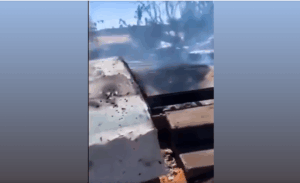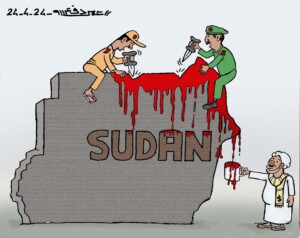Political visioning in Sudan: NUP-DUP agreement and FFC-CC vision published
A week of political visioning for Sudan: The National Umma Party (NUP) and the Democratic Unionist Party (DUP) agreed on an inter-Sudanese dialogue during a meeting in Khartoum on Sunday whilst the Forces of Freedom and Change-Central Council (FFC-CC) faction published its vision to end the coup and establish a new civil democratic path on Thursday.
 Sunday's meeting between the National Umma Party and the Democratic Unionist Party in Khartoum (social media)
Sunday's meeting between the National Umma Party and the Democratic Unionist Party in Khartoum (social media)
A week of political visioning for Sudan: The National Umma Party (NUP) and the Democratic Unionist Party (DUP) agreed on an inter-Sudanese dialogue during a meeting in Khartoum on Sunday whilst the Forces of Freedom and Change-Central Council (FFC-CC) faction published its vision to end the coup and establish a new civil democratic path on Thursday.
The National Umma Party (NUP) and the Democratic Unionist Party (DUP) agreed on an inter-Sudanese dialogue through a ‘national mechanism’. The parties do welcome cooperation with the international and regional community as facilitators in the political process to reach a solution to the Sudanese crisis.
Following a meeting in Khartoum on Sunday of two high-level delegations, one headed by Maj Gen Fadlallah Burma Nasir, the acting president of the NUP, and the other headed by El Bukhari Abdallah El Jaali, deputy head of the DUP, the parties appealed to all political forces in Sudan “to gather ranks and agree on the crucial issues of the homeland to achieve unity and a just comprehensive peace, and to complete democratic transformation”.
The two oldest political parties in Sudan who used to be bitter rivals since their establishment in respectively 1945 and 1952 also established a joint committee to coordinate positions on the current national issues.
FFC-CC vision
The Forces of Freedom and Change-Central Council faction has launched its vision to end the coup and establish a new civil democratic path.
In their vision, issued on June 2, the FFC-CC said that the way out of the current political crisis is “the end and overthrow of the current coup regime and a new constitutional establishment in which Sudan's authority is entirely civilian and the military institution is far removed from politics”.
'The way out of the current political crisis is the end and overthrow of the current coup regime' – FFC-CC
The FFC-CC declared their support for the role of the AU-IGAD-UN trilateral mechanism to facilitate the political process among the Sudanese.
The faction stressed the need to involve Sudan's regional and international friends, such as Sudan's neighbouring countries, the Sudan Troika (Norway, USA, UK), and the European Union as supporters of their envisioned political process and guarantors of the solutions it finds.
According to the FFC-CC, the political process will go through stages, starting with the ending of the October 25 coup of last year, followed by a new constitutional order, and the stage of the new establishment of the civil democratic path in a transitional period that should end with a constitutional conference.
The FFC-CC listed the parties targeted by the UN-AU-IGAD trilateral mechanism as parties they wish to enter in this political process: the putschists camp on the one hand, and the anti-coup forces that include the FFC factions, the Resistance Committees active in the neighbourhoods of the country, and the rebel forces (both signatories and non-signatories of the 2020 Juba Peace Agreement).
Most of the opposition parties and groups say they are prepared to talk about a solution for the crises in the country, but only after the military junta has stepped down.
Party positions
The Sudanese Congress Party stated on Tuesday last week that it will deal positively with the AU-IGAD-UN trilateral mechanism, provided that “the goal of the political process is to end the coup and to agree on constitutional measures under which a full civilian authority will be established”.
According to the Communist Party of Sudan, “the only solution is for the military to hand over power to the Sudanese people”.
The Sudanese Professionals Association (SPA), the driving force behind the December revolution that led to the ousting of dictator Omar Al Bashir, told Radio Dabanga last week that the SPA categorically rejects any dialogue with “the perpetrators of crimes that would lead to their impunity”, and demands, “like most of the people in Sudan”, a pure civilian government, the devolution of companies owned by the military sector of the Ministry of Finance, and justice for the victims of the junta.











 and then
and then